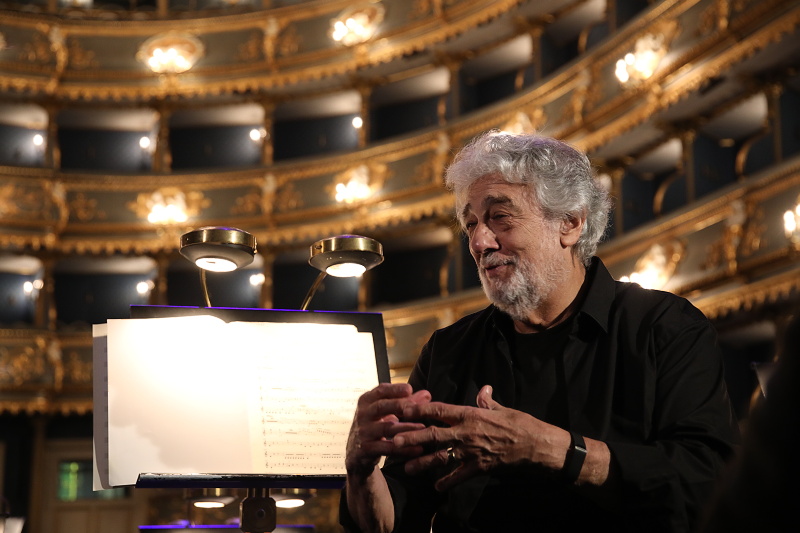Plácido Domingo performed in Prague for the first time in 1990 when he and soprano Ileana Cotrubaș gave a concert at St. Jacob’s Cathedral in Prague. For Domingo, this was the first performance in which he sang in Czech (Leoš Janáček) and for Cotrubas is was one of her last public performances. Domingo visited Prague several times in the following years, but always only in concert – never to perform in a full opera. His special relationship with the Prague Estates Theater, where Wolfgang Amadeus Mozart premiered Don Giovanni in 1878, is well-known. He celebrated the 230th anniversary of this opera’s premiere with a special semi-staged performance in the authentic setting of the Estates Theater. Shortly before the performance, Domingo even had a chance to flip through the original orchestral score from which Mozart conducted the premiere.
Plácido Domingo recently returned to the Estates Theater for a concert of Mozart’s arias and duets in honor of the composer’s birthday. He also expressed the wish to return in two years to present Mozart’s opera La Clemenza di Tito. Mozart also premiered this opera at the Estates Theater and, soon, it will be 230 years since that premiere. “When you imagine that Mozart and his librettist worked in this very theater, it is a great honor to present his works here,” says the singer, who has 4000 performances to his credit, 150 roles on his résumé, and, as a conductor, has led over 500 performances. On his last visit to Prague, I asked him for an interview. It took place at a rather symbolic location – the Estates Theater.
Mr. Domingo, have you noticed any new trends in opera today?
Times are always changing and trends change with it. But one of the most marked new trends is, in my opinion, the fact that there is a constant influx of new repertoire. It used to be that only one Janáček opera was played outside the Czech Republic and now it’s regularly three to four every season. There has also been a rediscovery of new works which used to be considered lost, even works by composers you’d never think could have new works discovered in the 21st century. After all, the probability of discovering new pieces by any given composer drops sharply as time passes. Another noticeable difference is that even audiences are more curious today and want to discover new works. And theaters are more open in this sense, as well. That is why theater managers, dramaturges, and we, the performers, are constantly looking for opportunities to present new works. This effort has also resulted in the rediscovery of operas by famous composers that were until recently considered unpresentable, because they were never finished, for example. Today, there is an effort to finish these pieces or at least get them to a state where they can be performed as a complete work.
How does your own repertoire reflect this trend?
In the beginning of my career, when I sang Massenet, it was most often Manon. I, however, discovered another six or seven works for myself to sing: Hérodiade, La Navarraise, Thaïs, Le Cid and others. I ended up singing all of them. It’s similar with Donizetti. He composed an incredible amount of operas but only three, basically, used to be performed regularly – Lucia di Lammermoor, Don Pasquale and Elisir d’amore. Now, another ten operas are performed. This is mainly thanks to some famous sopranos, great divas who discovered all of that long-lost beauty in Donizetti’s operas. And they used their considerable influence over the directors of opera houses, who needed to sign contracts with them, as leverage. And that is how all those (Tudor) queens made their way onto the stage – Anna Bolena, Maria Stuarda from the opera Roberto Devereux and even Elisabeth I. The opera Le duc d’Albe was similarly discovered.
Besides the expansion of repertoire, what else might we identify as a new trend?
I would also add that new theaters are being opened every day. The amount of theaters has grown. And they’re appearing in countries and cities which don’t have a long-standing operating tradition (Author’s note: Domingo’s last Operalia talent contest, for instance, took place in the new opera theater in Astana, Kazakhstan, built on land which, only 30 years ago, was a mere steppe.) But it’s not only theaters that are growing in number, it’s also various opera companies and promoters. And, of course, young singers. Theaters have created programs for singers at the beginning of their careers, which are supposed to help young singers find jobs in opera houses. The idea behind these programs is to catch more talent from the very beginning than we have in the past. They certainly achieved this but the system has its weak points. Because it allows us to catch new talent on an ongoing basis, more and more new voices are constantly entering the theaters. When an opera house accepts beginning singers into its studio and signs contacts with them, these singers finds themselves in a system where another, say, 12 young artists are already engaged. Maybe only one or two of them will be so exceptional as to be able to make it in a career on their own. The others would need some guidance, someone who would take care of them and give them time to gradually grow. But this isn’t happening. Precisely because new voices are entering the system every year, the theater can sign contracts with fresh singers instead of paying attention to the old ones. And so the less aggressive young talents are bulldozed by the singers that come after them. The number of singers is growing, but opera houses have no incentive to save their voices, educate them, grow them, and take care of them because it’s easier to simply replace them.
In general, however, I think that opera is more and more popular and interest in it is growing. It is also increasingly expensive, however. At the top opera houses, 500 to 1000 people are working backstage on every show. And those are expenses that have to be paid for, somehow. Ticket prices are increasingly reflecting this reality, especially in the US where opera is not state-subsidized.
But if ticket prices become too high, opera might become an elitist art form…
Opera, however, originally was an elitist art form. It was first played at royal courts for a very select group od people. Only in the times of Verdi did it become popular among ordinary people. (Editor’s note: This isn’t quite the case as opera was enjoyed, to varying degrees, among non-noble people throughout its history.) Today, opera is fairly widely spread and precisely because of the growing number of theaters and singers, it is increasingly accessible. This also, paradoxically, increases the aforementioned need to broaden the repertoire. And we search for this repertoire not only in the past, like I already mentioned, but also among contemporary composers, who are writing more and more operas. I also took part in this process. I sang up to 500 premieres of contemporary works in my life. And various composers write new operas for me to this day.
Do you like contemporary opera?
I do, but I don’t like it to be too atonal. I prefer a more melodic approach. I’m speaking, now, as a singer. As the director of the Los Angeles opera, I support the commissioning of new contemporary compositions. Opera as a genre is timeless, but its longevity depends on new supply and demand. Through commissioning new operas, we ensure contact with new, contemporary, composers and usher in a breath of fresh air, renewed enthusiasm, and progressive trends. Of course, the backbone of every great opera house will always be the classic repertoire. But it’s important to try new things, test yourself, always strive to learn, leave your comfort zone regularly. Never be afraid to enter the unknown.
In your autobiography My First Forty Years your write that when you’re learning a new opera at home and you come upon a passage which is too difficult, you don’t sing it over and over again, but just repeat it in your head…
Because I play the piano when I study new operas so I learn all those difficult passages by playing them. I don’t want to sing them again and again so as not to tire my voice. I also don’t want to create a psychological block that would alert me to a difficult, problematic passage every time it came up. I prefer to prepare it on the piano, just play it. This also allows me to see all those problems – I feel them, and I know about them. And I therefore know what to do about them.
But isn’t it risky not to try to sing them, too?
Well, I do sing them, eventually, but the best time for me is shortly before I go on stage, during the height of rehearsals. Everyone has their own preferred method, however, when it comes to technical issues of the voice.
It was Carlo Morelli, one of your first teachers, who gave you your technical foundation in the beginning of your career. He, too, was first a tenor and only later became a baritone…
But I was first a baritone and only later became a tenor. So I’ve returned to being a baritone, actually. In any case, when I was starting out I first sang baritone and it was Morelli who suggested I sing tenor. It was with him that I sang a high B for the first time. Then I sang tenor roles for over 50 years and didn’t return to baritone repertoire until 2009. But Morelli was always more interested in interpretation than technique. His classes fascinated me, they were amazing…
When he was dying, he gave you his sapphire ring in the shape of a two-headed snake. Maybe he wanted to encourage you through this mystical gesture. When you wear the ring, he’s with you…
I often have it with me. I take very careful care of the ring to this day.
Do you wear it on special occasions?
Yes.
Do you have it with you now?
No, I left it in London because I only came to Prague for a day.
In your book, you also recall rehearsing La Traviata with Maria Callas but, in the end, you never sang it with her. What happened?
She wasn’t singing anymore at that time. She was planning a comeback and Traviata was one of the possibilities for her to do so. And so she wanted to get together with me for that purpose. When we were in Paris, she first invited us to her apartment for a drink and then we set out to a restaurant. She told us various stories from her life. She complained that there weren’t any more good singers or conductors. We also discussed our plans for Traviata. Unfortunately, it never came to pass because she never returned to the operatic stage. She only did a series of concerts with Giuseppe di Sefano and that was all. She never had her comeback.
In the Three Tenors project, you and Luciano Pavarotti supposedly considered Peter Dvorský to complete your trio. Is this true?
No, it isn’t. Peter Dvorský is a fantastic tenor. I really admire him. He was definitely one of the greatest tenors and he could certainly sing in such an ensemble as the Three Tenors. But it’s not true that we considered him – that wasn’t at all the case. Carreras was very sick at the time and had spent an entire year in the hospital. We began to get very worried about him and when they finally let him out after a year, Luciano and I wanted to find a way to welcome him back. We decided to do a concert for three tenors and we began preparing it. So José Carreras became part of the trio because it was a celebration of his return. A way to welcome him home after his illness. This didn’t have anything to do with Peter Dvorský. But of course if we were to create some kind of Top 3 of tenors of the time we could make a number of combinations and Dvorský would be in most of them, I think. I always admired him and I admire his beautiful, great voice to this day.
Along with Pavarotti and Carreras, you sang 35 concerts. Besides friendly collaboration, did you ever experience professional rivalry?
It was a healthy competition in the style of: “Anything you can do, I can do better.”
I’m not sure if you’ve heard of the scandal in the town of Štúrov. Mrs. Éva Nothartová terrorized her neighbors in this South Slovak city by loudly playing your rendition of an aria every day, nonstop from six in the morning to ten in the evening. She would play it 242 times a day. And she did this every day for 14 years. The residents of the street could not make her turn off her speakers until the court made a decision about it. Mrs. Nothartová didn’t respect the court’s decision, however, and so they arrested her last autumn.
I know about this. I don’t know what to say about it, however. I heard that she was complaining about the neighbors because they had a dog who was always barking, which is why she decided to play my aria to drown out the sound of the dog. Maybe she liked the aria, I don’t know… And maybe she didn’t even like me but just wanted to scare her neighbors. And so she kept playing it again and again. I only know the first part of the story, about her playing the aria over and over. I didn’t know they arrested her…
Not only that but after they arrested her, your aria continued to play to the entire street for some time after. They found out that the recording turned on and off automatically…
On the one hand I’m sorry they arrested her on account of my recording. On the other hand, it’s probably over now and she probably won’t be able to continue listening to it. And the neighbors will finally have their peace and quiet. (Author’s note: Mrs. Nothartová is no longer in custody and was moved to a psychiatric hospital.)
Is this the first time someone has used your recording as a weapon?
I’ve never experienced anything like it before.
Wouldn’t there have been some kind of legal intervention possible from your end which could have ended the entire thing a long time ago? It’s your voice, after all, a piece of art you participated in making, and so I assume you can also say that you do not wish for your work to be used in this way, under these circumstances…
No, that’s not the case. I can’t say anything about it, or do anything about it. I have to respect the fact that she owns that recording, she bought it, and so she can use it however she wants. Which is what she did. I know it’s absurd but from a legal standpoint I clearly can’t do anything. It must have been very difficult to bear because I heard that the quality of that recording was very low, that it was a worn recording…
Yes, it whistled and it even slowed down in places similarly to a worn tape… I don’t know if you know this but the director Sláva Daubnerová wrote a play based on the motives of this scandal. It’s currently playing at the Slovak National Theater…
And do they play that recording?
I don’t know…
Maybe one day I could visit the show and sing it for them live…
But probably not 242 times in a row…
Definitely not… (laughing)
And finally, on a different note: Why did you decide to present the next installment of your Operalia singing competition in Prague, of all places?
Because for twenty-six years we have presented this competition in all the important cities of the world and, for me, Prague is a very important city. As much because of its beauty as its culture, its love of music. And there are also so many excellent voices, here… And so I was happy, in the end, that Prague was interested in us bring the competition here and that even the Czech National Theater agreed.
Your experience working with the National Theater has clearly been good, so far, given that they welcomed you here…
My collaboration with the theater thus far has been excellent.
Thank you for the interview!




